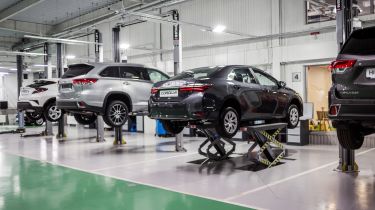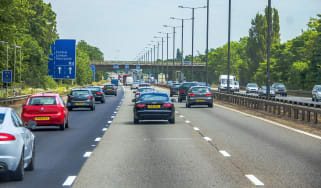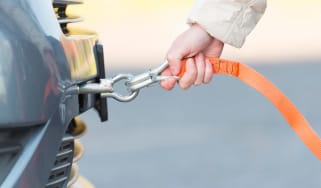Car recalls: how to check and should I worry?
A car can be recalled if the manufacturer identifies an issue after production – this is how they work

Car recalls are an important part of car ownership. If a manufacturer identifies a design flaw that could affect the car’s performance, safety or reliability, it may issue a recall to have the problem rectified. They’re fairly common in the car industry, but receiving a recall letter in the post can raise some questions and concerns.
Given how many cars roll off production lines in just a single day, some recalls can affect millions of cars and make headlines around the world. Most recalls only concern small batches of cars produced over a few days or weeks and are usually not serious enough to warrant immediate attention. However, some recalls involve critical safety components, such as brakes, airbags, or fuel systems, so they should never be ignored.
Below, we guide you through the business of recalls and what you should do if your car is affected.
What is a car recall?
Put simply, a car recall is a request by the manufacturer for you to take your car to your nearest dealer for checking or rectification work. The manufacturer covers all the costs, so you’ll never be charged for a recall.
Recalls can be issued for several reasons. If the manufacturer notices an unusually high number of customers experiencing the same problem, it may issue a recall to address this reliability problem. This is usually called a ‘service measure’ and if it’s not urgent, can be dealt with at the next routine service.
A service measure may be as simple as updating a piece of software. Sometimes a technician will need to check and, if necessary, replace a suspect component. In fact, the manufacturer may not even notify you about a service measure, and it will simply be performed as a matter of routine at your next service. However, the work will be recorded against the vehicle.
More serious recalls are triggered when safety is at risk. It’s carried out in conjunction with the Driver and Vehicle Standards Agency (DVSA) and owners of all affected vehicles are contacted and instructed to take their vehicles to their dealer for inspection or work. These recalls can involve issues with your car’s airbags, brakes, suspension or other components vital to your vehicle’s safety. As an example, Toyota recalled the bZ4X in 2022 due to faulty wheel bolts, while Volkswagen recalled the Polo for a rear seatbelt issue.
Fortunately, it’s relatively easy for car makers to identify at-risk vehicles because every stage of the car’s construction is recorded in painstaking detail, right down to component serial numbers and the precise time the part was fitted. If your car is identified as being at risk, you should receive a recall notice in the post.
Don’t be unnerved if you read a dramatic headline in the media about your car – recalls are often purely precautionary and only in very rare cases are owners instructed not to drive their cars until recall work has been carried out. It’s easy to find out whether your car is affected by a recall, as we’ll outline in this guide.
How do I check if my car has been recalled?
If your car has been recalled, the manufacturer should let you know by post. A letter will be sent to the address of the registered keeper of the car, which should be up to date on your V5C vehicle logbook.
If you hear about a recall you think may affect your car, you can check by using The Motor Ombudsman’s Vehicle Safety Recall search. By using this, any recalls that are active for your car can be identified. To use this tool, you’ll need the Vehicle Identification Number (VIN) for your car. This is a long code number that appears on the chassis plate of your car or – on most UK-registered cars – in the bottom-left corner of your windscreen. Your car’s VIN will also be printed in your V5C document.
You can also usually find more information from the website of your car’s manufacturer, or the Driver and Vehicle Standards Agency’s recall checker tool.
I’ve received a recall notification – what now?
If you’ve received a recall notification from the manufacturer of your car, it should contain instructions on what to do next.
There may be details of an allocated dealership given on the recall notice, or you may be asked to contact your local dealer directly. The majority of recalls issued are precautionary, so you shouldn’t need to take it in for repair immediately unless the notification says so. We recommend contacting your dealership and making a suitable appointment as soon as is convenient.
It’s always important that any recall work is carried out. Aside from possible safety implications, there’s a risk that a missed recall could reduce the car’s value, make it harder to sell or even invalidate your warranty.
Where do I take my car if it’s been recalled?
If it’s confirmed there’s an active recall for your car, you should make contact with a dealer or workshop that’s been officially authorised to perform repairs on behalf of the manufacturer.
Usually that’ll be your nearest franchised dealership, or ‘main dealer’ as they’re sometimes known. Independent mechanics or garages that operate outside a manufacturer network aren’t authorised to perform recall work.
Do I have to pay if my car is recalled?
No, you should never have to pay for any work relating to an active recall. These recalls have been put in place by the manufacturer and if your car is confirmed as affected, the workshop carrying out the repair will be paid directly by the manufacturer.
If a workshop insists on charging you, you should contact your local Trading Standards office or the UK headquarters of your car’s manufacturer.
However, if other problems are found during the recall process, such as an unrelated item suffering wear and tear, this can be carried out at extra cost. The dealer should notify you of any additional chargeable work and provide you with a quote before carrying out the work. The final decision as to whether to have that work carried out always rests with you.
It’s also worth considering that recalls don’t always remain ‘active’ forever. If a manufacturer launches a recall campaign that isn’t safety-related, it’s under no obligation to keep that campaign open for any longer than it wants. That’s why it’s important to address any recall work earlier rather than later.
Some recalls involve very expensive repairs. If an affected vehicle is brought into the dealership after the expiry of that recall, the service department is under no obligation to perform the work for free.
Can I receive compensation if my car is recalled?
Manufacturers are obliged to perform necessary recall work free-of-charge, but they’re under no obligation to provide compensation for your inconvenience.
If you feel that compensation is due, you would be best advised to contact the customer services department of your car’s manufacturer rather than to demand it from your dealership.
Occasionally issues arise where the reputation of a car is sullied by a recall issue, particularly among cars experiencing high-profile media coverage. Recall compensation is likely to be decided by the manufacturer on a case-by-case basis, but is generally rare.
There is no standard way in which manufacturers are supposed to act where there are questions over how a customer has been treated during a recall. In the case of the Volkswagen Group and issues of alleged deception over misrepresentation of emissions ratings, legal proceedings resulted in payouts for some owners of affected vehicles.
What about my car's resale value?
Allowing a recall repair to be performed on your car will not negatively affect the value of your car at time of sale. However, not having the necessary work completed could result in the car losing value, as it means a subsequent owner will themselves need to arrange for that work to be done.
What do recalls mean for car manufacturers?
The worst possible outcome is a recall that’s handled badly, as this can result in severe long-term damage to a brand’s reputation.
The most obvious factor a manufacturer has to deal with is the financial impact of a recall. Every official workshop is paid by their respective manufacturer to do recall work when necessary. If the recall is to replace a faulty part, the manufacturers can sometimes partially recover costs from their suppliers. Often, though, the manufacturer has to bear the brunt of the cost.
It’s not all bad news, though. If a recall is handled well it can be seen as a good thing. The truth is that a recall means a carmaker has recognised its product can be improved and is willing to pay for that improvement to be made.
It’s not unheard of for car owners to receive recall notifications long after the warranty has expired, with their car perhaps not having been serviced by a main dealer for years. Arguably, an offer of a free recall repair can be taken as evidence that the manufacturer cares about you and your car.
More on common car problems
- Engine management light explained
- Guide to dashboard warning lights
- Reporting a car fault
- Smoke from exhaust explained
- Car suspension noise explained
- Guide to car windscreen repairs
- Car exhaust noise explained
- Car burning smells explained
- Car smells explained
- Engine noise explained
- Rattling noise explained
Recommended

Classic car tax exemption: which historic vehicles qualify?
Most Popular
Tips & advice

Car dashboard warning lights: what does each symbol mean?

Electric car charging stations: public networks, charger types, apps and maps








